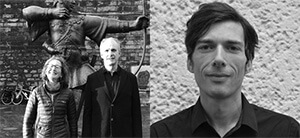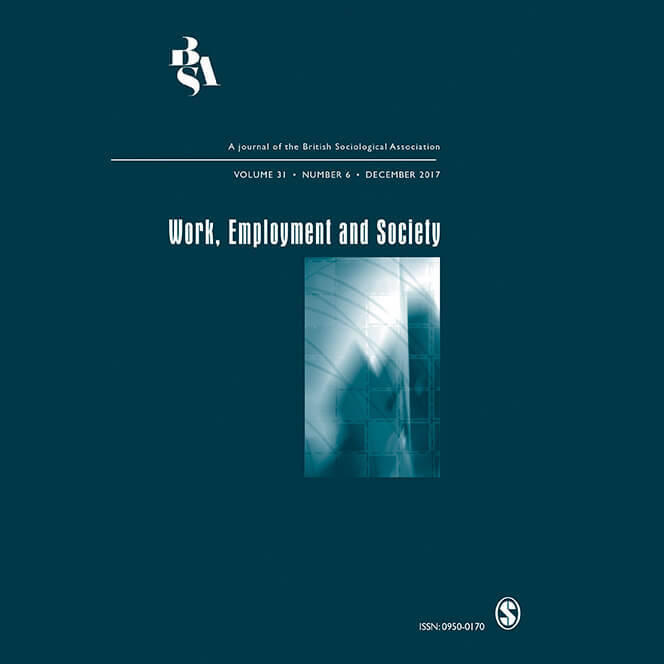After a successful application process, Work, Employment and Society (WES) appointed three new Editors to join the journal in January 2022: Laurie Cohen and Marek Korczynski (left) as Editors-in-Chief and Knut Laaser (right) as an Editor.

Marek and Laurie had the following comments about the experience of starting the role and their plans:
On the first of January this year we began our term as WES Editors-in-Chief. We’ve both been involved with the journal for years, as authors, editors and conference participants. We love the journal’s vibe, its commitment to quality, collegiality, and above all, its desire to honour the history of the sociology of work, whilst at the same time pushing its boundaries. We both aspired to one day taking a leading role in the journal. We’ve been colleagues forever, and when we saw that it might be possible to do this together, we jumped at the chance.
We’d like to take this opportunity to thank the previous Editors-In-Chief, highlight the amazing behind-the-scenes work of Alison Danforth, Madeleine Hatfield and Amber Davis and to say a few words about our ideas for the future.
We are really lucky. Elizabeth Cotton, Ian Roper and Eleanor Kofman have handed over to us a journal that’s in great shape. The content goes from strength to strength and has an ever-clearer identity (so many people we’ve spoken to have referred to papers as being ‘WESy). Submission numbers have never been higher. At the same time, Elizabeth, Ian and Eleanor and their great team of editors have taken on big challenges, such as internationalisation, and their efforts are already clearly visible in our growing reach, in terms of both the articles we publish and our readership.
Backstage, as we prepared to take on these new roles, we were repeatedly told of the editorial team’s collegiality, and its commitment to support and development. From our earliest conversations with members of the team, we have both been struck by just how many of them described their journal work as the best part of their job! For Elizabeth, Ian and Eleanor, this is quite a legacy. As we know, a sense of commitment and solidarity does not just happen, but rather is the consequence of explicit processes, practices and underpinning values. We thank Elizabeth, Ian and Eleanor for paying attention not only to the content of what WES publishes, but also to how the journal works, and to how people relate to one another.
Behind the scenes, Alison, Madeleine and Amber keep the show on the road. Alongside what we’ve said above, an underpinning theme of our discussions has been just how wonderful they are: friendly and approachable, supremely competent and knowledgeable, and astoundingly helpful – answering every question and concern, whether ordinary, tricky or wholly unexpected! Alison, Madeleine and Amber have welcomed us warmly into the WES community and are helping us to learn the ropes. We are looking forward to working with them and learning from them, as well as from our fabulous group of editors, members of our Board and the International Advisory Committee.
We have some exciting ideas for the future. In the short term, we will be publishing sub-themes on power, control and resistance; migration; and meaningful work. In line with our commitment to development, we plan to introduce a new section showcasing outstanding doctoral work. And consistent with our commitment to the foundations of the Sociology of Work (but also its interrogation), a section on ‘Working Classics’ is also in the pipeline. Permeating what we do will be an on-going commitment to equality, diversity and inclusion, and we will continue to support the internationalisation agenda, again, focusing on development, capacity-building and broadening our reach.
The Sociology of Work is at the heart of our academic practice. Our discipline has the power to provide new insights into our working lives, to challenge existing understandings and to offer alternative ways of seeing. This is profoundly important now as ever. We are delighted that through our roles as Editors-in-Chief, we will be part of the on-going evolution of our field, and possibly a bit daunted by the challenge. But we know that we have a great community that shares our commitment. We are looking forward to working together.
Knut Laaser is also joining the WES Editorial Team – moving up from a very active Board member role to take on new involvement as an Editor:
I am thrilled about my new role as Editor for Work, Employment and Society. In the past few years the journal has become my intellectual home. I have been an Editorial Board member since 2019 and enjoyed from the first day the collegial atmosphere, its commitment to diversity and inclusion and the way it celebrates the sociology of work through excellent publications, bi-annual conferences, early career mentoring and many more developmental initiatives. As an editor, I am looking forward to working with my colleagues at WES on the collective vision of the journal as an inclusive and critical intellectual outlet for the best scholarship in the sociology of work.
Work, Employment and Society is a journal of the British Sociological Association and its successes are due in large part to the efforts of our members who act as Editors, authors and peer reviewers. BSA members support the Association’s charitable aim of promoting sociology in the UK and beyond – find out more about BSA membership.
Work, Employment and Society is a leading international peer-reviewed journal with an Impact Factor of 5.116 and a Chartered Association of Business School AJG ranking of 4. It publishes theoretically informed and original research on the sociology of work, covering all aspects of work, employment and unemployment, and their connections with wider social processes and social structures.


